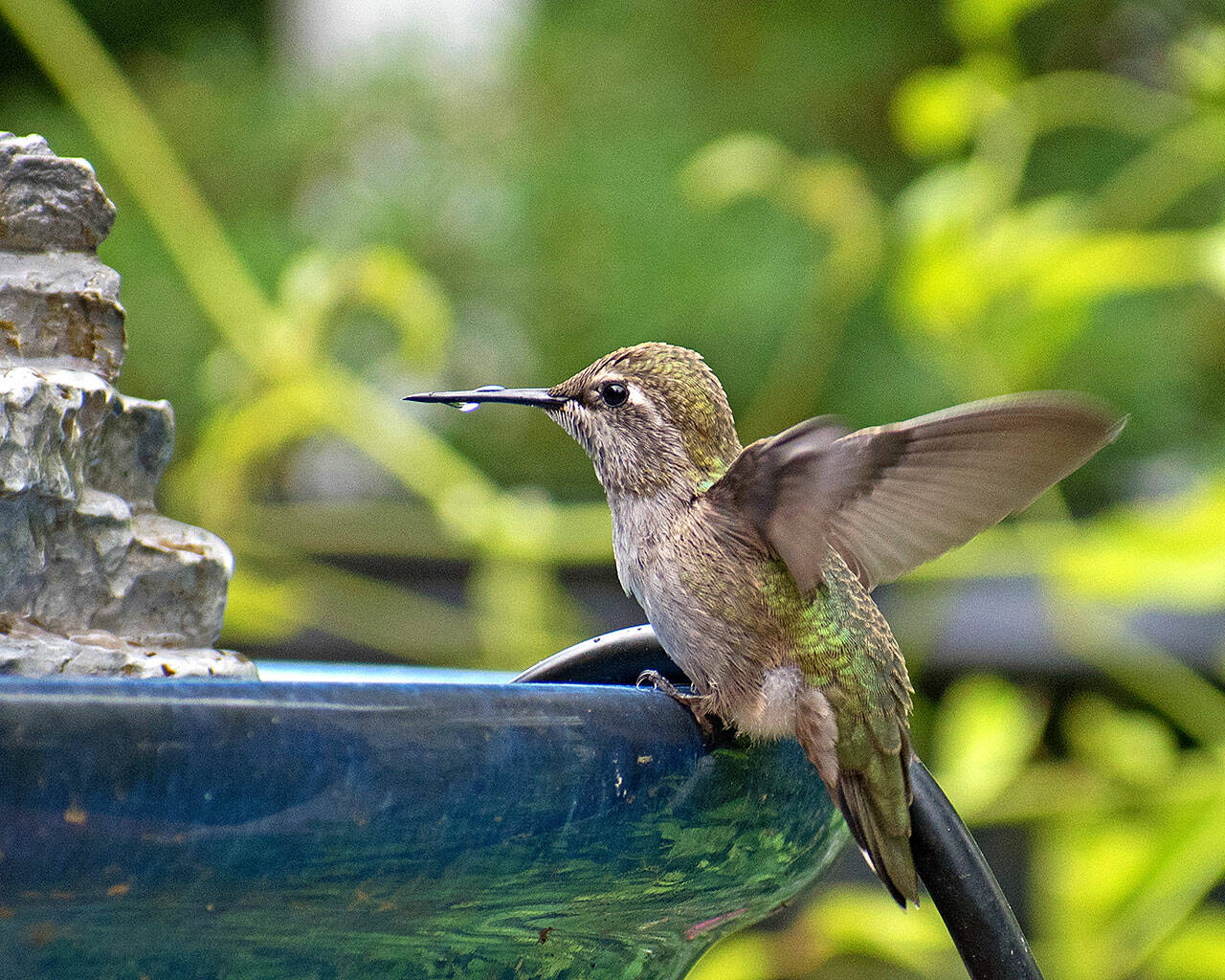By William McClain / Special to The Herald
Editor’s note: This is the second in a series of five articles during April, Native Plant Appreciation Month, about the importance of native plant landscaping in the Snohomish County garden.
Many people think of native plants as a nice-to-have, granola sort of thing. In fact, they are critical to our environmental health.
To understand why, we must start with insects. As mentioned in last week’s article, they are the central players holding together the environmental web. A good example of this is found among our birds. While most songbirds receive nourishment from seeds, berries and bird feeders, they depend on insects for the protein-rich food they need for nesting and raising their young. Caterpillars are an especially important source of food.
So, what does this have to do with native plants? Around 90% of plant-eating insects are specialists. This means they rely on one or perhaps a few plant species for survival. The classic example of this is the monarch butterfly, which during its caterpillar stage, depends on the milkweed plant for food. Eradication of milkweed has resulted in a 96% decline in monarch butterflies.
Why do so many insects specialize? It all comes down to the fact that plants don’t like to be eaten. To protect themselves, they use a wide array of toxins and other defenses. Insects and other plant eaters have, over many thousands of years, developed ways to get past those defenses. For example, milkweed earns its name from the sticky white sap excreted from its leaves. The sap gums up the mouths of would-be insect predators. Monarch caterpillars have learned to work around this by notching the main vein of the leaf, allowing the sap to drain off before eating the rest of the leaf. Milkweed also produces potent toxins that stop most insects. Monarchs have developed enzymes to lessen the effect of those toxins. They’ve even learned to hijack the milkweeds defenses by storing the toxins in their wings, which helps ward off their predators.
Although monarchs and milkweed are not native to the Northwest, many similar interdependent relationships can be found among species that are native to our area.
Non-native plants have an unfair advantage over native plants. In their new surroundings, they lack the insects and other predators that, over many thousands of years, have learned how to get past their defenses. Without natural predators, they expand and replace native plants in our open spaces, highway margins and conservation areas. When this happens, the insect population plummets, especially caterpillars, and as a result our songbirds disappear. The decline in bird populations cascades through the food web, impacting raptors and other higher-level predators. Examples of aggressive non-native plants in our area include English ivy, evergreen and Himalayan blackberries and English holly.
Native plants interact with each other in ways that we are only beginning to understand. An example of this was discovered in British Columbia when investigating why Douglas firs became diseased after their birch-tree neighbors were removed. It was discovered that the trees were sharing nutrients back and forth through the soil fungus connections among their root systems. This arrangement worked because it benefited both tree species. Non-native plants lack these types of connections, because they take many thousands of years to develop.
Clearly, native plants nourish and protect our environment in many ways. That’s not to say that everyone should be expected to completely rip out an existing landscape in order to replace it with natives. Instead, strongly consider natives anytime you are adding or replacing plants, or as a way to enhance your existing landscaping.
When choosing plant species, take note of the site conditions, including amount of sunlight, soil moisture and condition, slope, drainage and space. With this information in hand, you will be able to take full advantage of the expert resources available to help you select plants. It’s important to identify plant species that will thrive in the conditions your site offers. Our native flowering currant is a favorite that can tolerate a variety of conditions. It’s prized for its early spring color, and appreciated by our native Anna’s hummingbirds as a source of nectar at a time of year when other options are less plentiful.
Websites to explore
For more information on native plants, visit the Washington Native Plant Society website, www.wnps.org. From their website, you can link to our local Salal Chapter of the WNPS, www.wnps.org/salal.
The National Audubon Society also provides information on bird-friendly gardens as well as a native-plant directory which you might find useful (www.audubon.org/PLANTSFORBIRDS). Also, their “Plant for Birds” sign can help start conversations with neighbors about wildlife-friendly gardens (tinyurl.com/EDH-audubon).
If you’d like to view native plantings first-hand, consider visiting the Edmonds Wildlife Habitat & Native Plant Demonstration Garden sponsored by Pilchuck Audubon Society, our local Chapter of the National Audubon Society (www.pilchuckaudubon.org/edmonds-wildlife-habitat-native-plant-demonstration-garden). It’s located at 95 Pine St. in Edmonds. You can also visit the Salal Native Plant Garden, a collaboration between the Salal Chapter of the Washington Native Plant Society and the Washington State University Agriculture Extension. It’s located at 16650 State Route 536 in Mount Vernon (www.wnps.org/salal-programs/garden).
Snohomish County Public Works maintains a list of nurseries in Snohomish, King and Skagit counties that offer native plants for sale: tinyurl.com/EDH-nurseries.
Next week’s article will explore how your garden’s soil plays a key role in your landscape’s environmental productivity. We’ll discuss the numerous benefits of taking a natural approach to maintaining soil health.
William McClain of Lynnwood is a member of the Pilchuck Audobon Society. A native Washingtonian, he published his first novel, “The Risk in Crossing Borders,” in 2020 after retiring from a career in benefits consulting. He hopes to publish a second novel set in England during World War II in 2023. HIs interests include hiking, nature photography and playing soccer.
Talk to us
> Give us your news tips.
> Send us a letter to the editor.
> More Herald contact information.

























